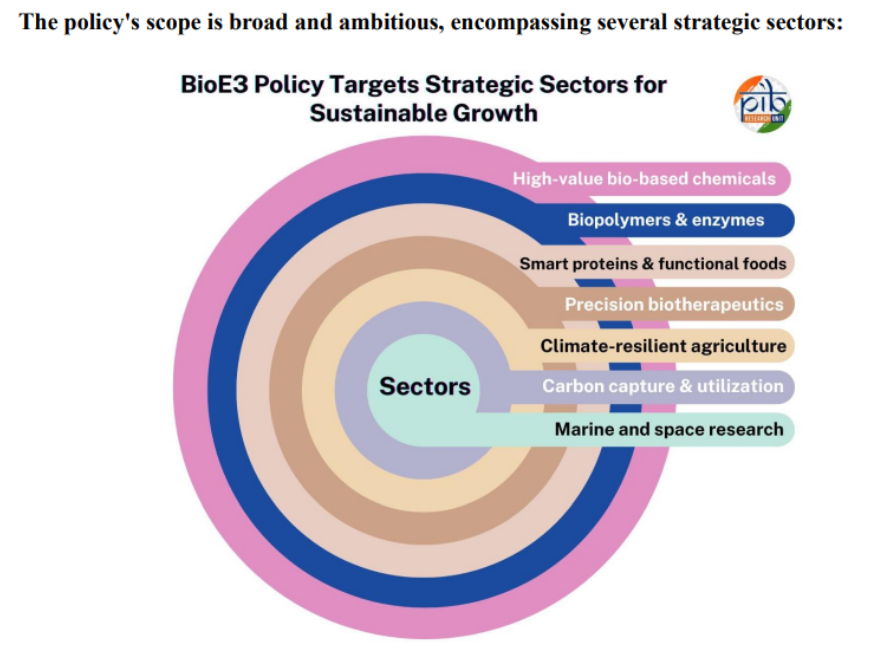India’s BioE3 Policy: Pioneering Sustainable Economic Transformation Through Biotechnology
(Source: Indian Express; Section: Explained; Page: 16)
| Topic: GS3 – Science and Technology |
| Context: |
|
Analysis of News:

Overview of the BioE3 Policy
- The BioE3 (Biotechnology for Economy, Environment, and Employment) policy, recently unveiled by the Indian government, is designed to stimulate growth in the biotech sector.
- However, its broader goal is to transform industrial and manufacturing processes to be more sustainable and less wasteful by leveraging biotechnology.
- This policy marks the beginning of what officials term the “industrialization of biology,” which could significantly impact the economy.
Potential of Biotechnology
- Biotechnology encompasses a wide range of fields, including genomics, genetic engineering, synthetic biology, and more. Advances in these areas have led to the development of environment-friendly alternatives to traditional products and processes, such as bioplastics and precision fermentation for animal-free milk.
- Additionally, biotechnology offers innovative solutions like carbon capture using microorganisms and the development of synthetic biology for creating novel organisms and biochemicals.
Benefits for India Through BioE3
- The BioE3 policy aims to prepare India for future economic transformations driven by biotechnology.
- While immediate economic returns are not expected, the policy focuses on building competencies, promoting research, and fostering talent to position India advantageously when these technologies mature.
- The potential economic impact of biomanufacturing alone is estimated to be between $2-4 trillion over the next decade.
Strategic Initiatives and Future Outlook
- The BioE3 policy aligns with other government initiatives like the Artificial Intelligence Mission and the Green Hydrogen Mission, which aim to develop and harness emerging technologies crucial for the global economy and addressing challenges like climate change.
- The policy envisions creating biomanufacturing hubs across India to support the production of bio-based chemicals, smart proteins, and other specialized bio-products, with a focus on six key areas including climate-resilient agriculture and marine research.
Implementation Challenges
- The BioE3 policy, piloted by the Department of Biotechnology, requires collaboration across at least 15 government departments to succeed.
- Its implementation will involve overcoming scalability, financial, and regulatory challenges to fully realize the benefits of biotechnology in transforming India’s economy and industrial processes.
| What are the Challenges for Biotechnology in India? |
|
| PYQ: What are the research in developmental achievements in applied biotechnology? How will these achievements help to uplift the poor sections of the society? (250 words/15m) (UPSC CSE (M) GS-3 2021) |
| Practice Question: Evaluate the potential impact of India’s BioE3 policy on the country’s industrial and manufacturing sectors. How might biotechnology-driven innovations transform these sectors, and what challenges must be addressed to achieve the policy’s goals? (250 words/15 m) |

